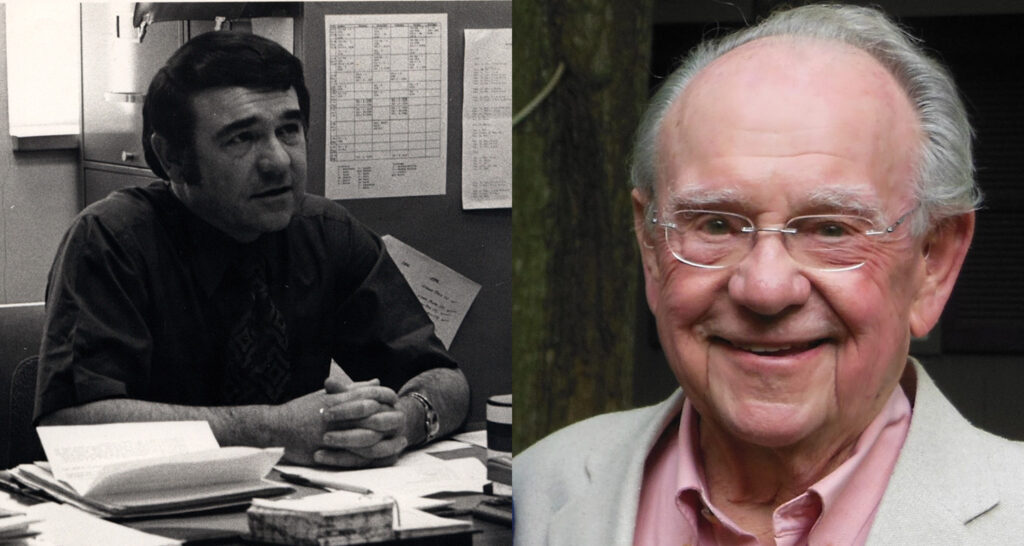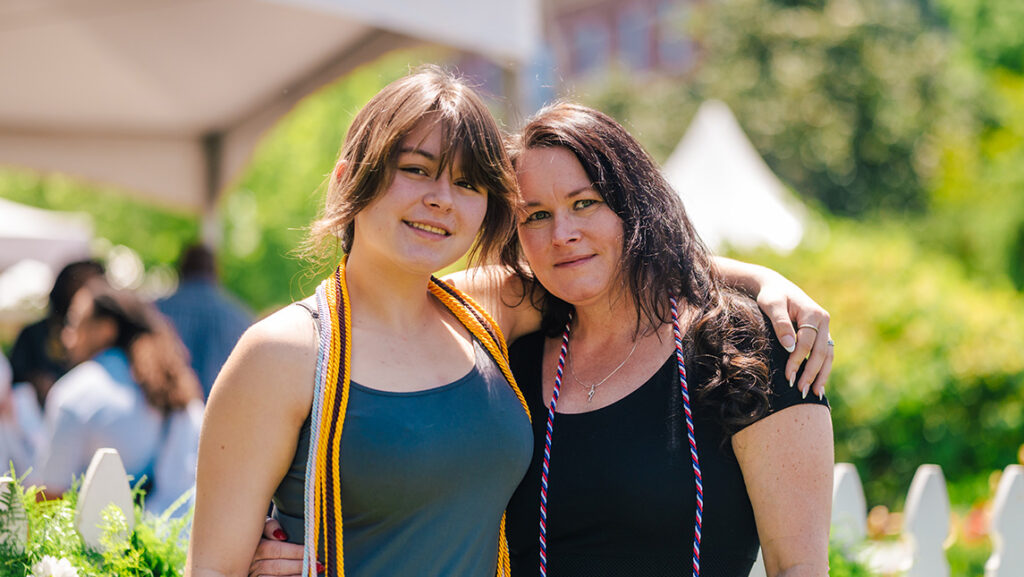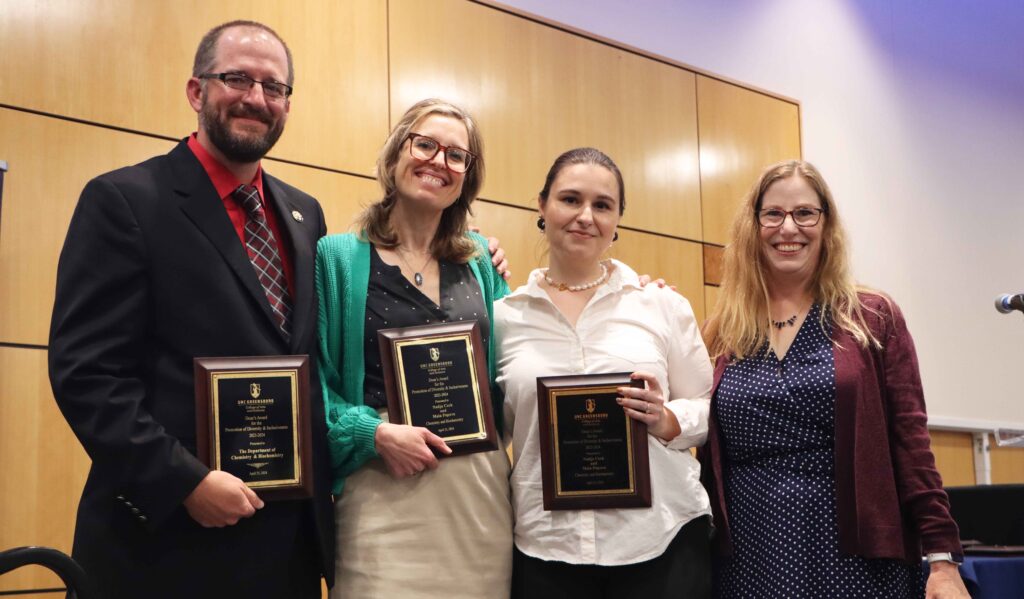
Dr. Cerise L. Glenn, associate professor of Communication Studies and outgoing director of the African American and African Diaspora Studies program, writes about the concrete steps people can take to become allies in the fight for systemic change.
Over the course of the past several weeks, UNC Greensboro Black faculty, staff, and students have experienced vicarious trauma and continue to feel emotions of anger, fear, and frustration at the state of our nation. We are not okay.

The recent murders of and police brutality against peoples of African descent have garnered international attention. The murders of Ahmaud Arbery, Breonna Taylor, and George Floyd have been eye-opening for many. However, the disgust and pain felt across all walks of life is a 400-year-old wound for African-American communities.
We’ve seen statements, both formal from members of the UNCG community, corporate entities, and other organizations, as well as informally on social media posts. The statements matter and are appreciated, but also reveal the stark reality we’re experiencing during this unprecedented time. Although some are taking important action steps to combat racism and other forms of discrimination, some are failing to recognize and therefore do not adequately address systemic and institutional dynamics that also need to be incorporated into any analysis of the problem. As such, I urge our colleagues to take the following important steps to become an ally, accomplice, and advocate for systemic change.
Your Silence Hurts—Raise Your Voice
It’s time for you to raise your voice and increase your involvement. This is especially true of those in positions of social privilege and power. The time for complicity, passive, and implicit support has passed; you must DO something and SAY something. Understanding is an important starting point. However, we encourage careful thought and consideration for the trauma people of color constantly experience. We need more allies and advocates working toward systemic change. We seek colleagues who appreciate that being an ally takes action with intention. Some of your actions can be more harmful than helpful, while others make important advances to challenge the interlocking systemic matrices of marginalization.
We have seen postings of Dr. Martin Luther King Jr.’s quotes to condone and condemn those who would stand up to injustice. He has also been credited with saying: “In the end, we will remember not the words of our enemies, but the silence of our friends.” Don’t be silent. When you hear a racist or sexist comment, speak up. If you witness a microaggression, address it. If you don’t, what we hear you “say” is that you think Black lives matter, but not more than your own feelings of discomfort.
We don’t only want your empathy; we seek the explicit articulation of your allyship. Sending a text message after a faculty meeting to let your colleague know you don’t agree with something is not nearly as helpful as if you would have spoken up at the moment. We are not advocating for you to be combative, but curious. Actively perform curiosity. Ask questions not in an accusatory way, but in a way that creates more conversation and invites others to be more curious. For example, this can be as simple as saying, “When you say XXX, what do you mean?”
Acknowledge, affirm, and appreciate diverse perspectives that can be quickly dismissed. This can be as simple as stating, “I believe XXX had the floor when you cut her off. Please let XXX finish her thought.” When you hear issues about faculty disproportionately calling the campus police on their students of color, especially Black male students, ask to put this on the agenda for the next faculty meeting to learn more. Help schedule the visit from the Dean of Students Office about alternate ways to engage “disruptive” students in the classroom when it’s offered so there can be a collective conversation. When more people speak up, it sets the tone that these issues matter and are worthy of all of our time and effort. It takes more than one voice to create a culture that affirms inclusivity, and it takes silence to reinforce that it doesn’t.

Actively Take Steps to Learn About Systemic Racism
We’ve been asked our opinions on racism in ways that are unnecessarily hurtful, including being sent racist images and statements for input, without people thinking about how traumatic that is for us. We’ve been sent various disturbing images, such as the horrific George Floyd challenge currently circulating on social media.
Think about the effect of your actions on your Black colleagues and friends. Also keep in mind students and others are contacting us for support. We’re exhausted on many levels. Your pathway to awareness and action cannot travel through our pain or the pain of other people of color. We also need “everyday” people to stop and think about what can be done to enact lasting social change.
There are many resources, ranging from academic books to performative expressions to movies and documentaries to short video clips that discuss the long history and long-term effects of systemic racism and other forms of marginalization. They’re out there—you need to do the work to engage them. Don’t put the burden on people of color who are hurting to explain it to you. We are in a place where we can’t continue to sacrifice mental and emotional well-being in hopes of your elucidation.
We need to have true dialogue and action steps, not just talking, about these issues. In order for that to happen, start doing the work before you come to the table. These resources compiled by the University Libraries provide information to learn about and actively engage anti-racism activities, including books, film, podcasts, and area organizations.
Actively Engage and Support the Work That Needs to be Done
Be courageous. Actively take larger steps, like suggesting ways to genuinely foster equity, diversity, and inclusion (EDI) and then joining the committee to make the work happen. Don’t wait for a person of color to do it and/or expect us to do this on our own when it means continually overloading the few Black faculty and other faculty of color we have.
Really commit to the work. There have been several groups, both formal and informal, working for systemic change. Some are more effective than others, with some waning after the phase of initial support. There are current efforts that still need support, such as ongoing work with campus police. Efforts such as Community Play! brought campus police, students, faculty, and administrators together to discuss and improv about community issues. The committee working with police relationships needs support and committed members. As we engage in various service activities related to our positions, consider these service opportunities that do not receive as much attention as other committees.
Understand that this work needs long-term commitment. Our NSF ADVANCE team speaks to this. This is a federally-funded grant and ongoing project with the aim to reduce gender inequity from an intersectional perspective (see more about NSF ADVANCE projects here: https://www.nsf.gov/crssprgm/advance/). Our team at UNCG has gone through many changes over the years. We’ve been meeting for the past seven years, with members leaving and joining our team. Some people gave up on the work and left, others stayed consistently with their support, and we found new members who are actively and continually committed to the work.
Our grant is led by four women of color, three are African American women, and the support and engagement of allies has been instrumental. It was disheartening at times to feel like the work we did doesn’t matter or isn’t worth others’ investment of time and energy; however, our allies helped sustain our resolve and actively helped when we felt overwhelmed. It comes from those who assist with budgets, who really listened to what we were trying to do and first sought to understand as they supported us. It’s having multiple meetings to help us flush through some of our budgetary and content issues to translate our aims into “grant” language.
Although not part of their jobs, these allies continually gave us moral support, which we needed when others discouraged us from applying for the grant. This comes from senior administrators, who took us to lunch after our first unrealized attempt at submitting our grant submission instead of dismissing us. They also committed to do the work to show their commitment to EDI issues. When we were awarded and celebrated the launch of our grant in October 2019, several members of the UNCG community attended to learn more about our work. This also generated conversations about collaboration to actively support EDI. Both these small and large gestures matter.

As we continue this work, please understand Black faculty, staff, students, and administrators may feel simultaneously heartened and disheartened as we process the unfolding events. The diverse groups of protestors and acts of support gives us inspiration. The backlash of racist comments and actions hurts our souls. We’re tired and at times overwhelmed, but many remain committed to doing the work that needs to be done—in our communities, friendships, disciplines and at UNCG.
As we keep working, please keep an eye out for future NSF ADVANCE activities, such as the allies and catalysts for change workshops we had to postpone due to the coronavirus pandemic. The Faculty and Staff Senates and Chancellor’s Fellow for Campus Climate are also working on initiatives for sustained change. The College of Arts and Sciences has an active Diversity Committee with many interesting activities. As the outgoing director of the African American & African Diaspora Studies program, I immensely enjoyed planning and working with fellow faculty and students to present work on diverse populations, such as at the annual Conference on African American and African Diasporic Cultures and Experiences
Other opportunities will continue to unfold—so please be actively involved to long-term commitment to making UNCG’s infrastructure as diverse as its student population. As a minority-serving institution, it’s critical for the well-being of our university and all members of our community.
Read more about Dr. Cerise L. Glenn
Explore UNC Greensboro’s new Racial Equity website.






